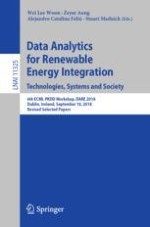2018 | OriginalPaper | Buchkapitel
Machine Learning as Surrogate to Building Performance Simulation: A Building Design Optimization Application
verfasst von : Sokratis Papadopoulos, Wei Lee Woon, Elie Azar
Erschienen in: Data Analytics for Renewable Energy Integration. Technologies, Systems and Society
Aktivieren Sie unsere intelligente Suche, um passende Fachinhalte oder Patente zu finden.
Wählen Sie Textabschnitte aus um mit Künstlicher Intelligenz passenden Patente zu finden. powered by
Markieren Sie Textabschnitte, um KI-gestützt weitere passende Inhalte zu finden. powered by
